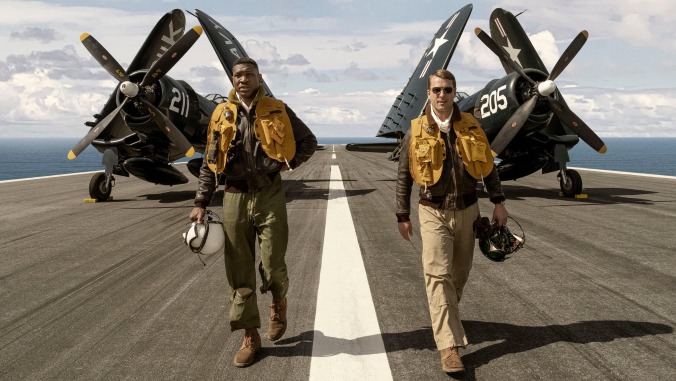Devotion is a little too polite to earn its emotional title
Despite a star-making performance from Jonathan Majors, the Korean War film Devotion never flies as high as it aims to

Early on in Devotion, Jesse Brown (Jonathan Majors), the first Black aviator in Navy history, tries to psych himself up before taking to the skies. It’s a pivotal moment in the film and uses a classic film trope: talking to oneself while looking at the mirror. Think Robert De Niro in Taxi Driver or Matt Damon in The Talented Mr. Ripley. It’s the kind of cinematic moment that could catapult an actor into stardom. Majors is certainly at that point in his career, after breaking out with The Last Black Man In San Francisco and proving himself with subsequent roles in Da 5 Bloods and The Harder They Fall. Director JD Dillard allows Majors to take full flight in this scene, squarely showing off the actor’s intensity. What is more striking, though, is the context. Brown motivates himself by hurling at the mirror the racial epithets he hears every day. Thus Devotion sets its theme of overcoming adversity while allowing its lead a signature moment.
Based on the book by Adam Makos and adapted by Jake Crane and Jonathan A.H. Stewart, Devotion takes place during the Korean War in the 1950s. It follows Brown as he prepares in Florida and then into combat in Korea. However, it’s less of a war epic and more of a friendship story tracing Brown’s relationship with a fellow pilot, Tom Hudner (Glen Powell). The most crucial line in the film is not some major hooyah declaration about speed or defeating the enemy but a rather simple “Be my wingman.”
The friendship is tentative at first. Brown is the only Black fighter pilot in the Navy and so he takes his time trusting Hudner. Some of the other pilots taunt and mock him because of his race. Everywhere he goes, being the “only” or the “exceptional” weighs heavily on him. Majors excels at presenting this burden, as in a scene where the other Black servicemen show their belief in him and admiration by gifting Brown with a watch. Majors’ face telegraphs a lot of what is not said about carrying the burden of being singled out to validate the existence of a whole race.
Though Majors is able to show Brown’s inner turmoil, a spark with Powell never ignites. Their scenes together never hint at the bond that the film tries to make its central premise. There’s an air of politeness that governs this relationship. In their attempt to present a wholesome friendship, the writers end up showing one that doesn’t connect. Even when they drum up a conflict that might bring some fireworks, they quickly resolve it and Majors and Powell are quickly back to being polite and reserved with each other. When, by the end, they ask for the audience’s tears, it seems a preposterous ask because the groundwork has not been laid.
Powell gets to strut and flirt when the squadron stops for a brief break in the South of France. That interlude acts as a fun time for the audience too as Brown meets Elizabeth Taylor (Serinda Swan) and she invites them for a night out on the town. However, Majors is stuck playing the square as the screenplay deprives him of showing different facets of Brown or his own screen persona.
The film also presents a rather uncomplicated marriage between Brown and his wife, Daisy (Christina Jackson). It’s so neatly packaged, it borders on hagiographic. They are always absolutely supportive and loving towards each other at all times with no hint of how a real marriage functions. The way these two relationships are presented shows the filmmakers’ admirable attempt to pay respectable tribute to the memory of the Brown and Hudner families. But respectful and polite can never substitute for exciting or recognizably real.
Devotion is slow to get to the aerial fights and the war, spending too much time on the buildup and training. You expect a film sold as a war epic to have epic battles or at least exciting sequences. There the film falters too, with a few mildly entertaining but unmemorable scenes. Chanda Dancy’s score swells to hide what’s not on screen. The screenplay has not distinguished any of the fighter pilot characters beyond Brown and Hudner, so it becomes hard to invest in their fates. Giving an intriguing metallic blue hue to the night sky, Erik Messerschmidt’s lensing of the aerial shots is evocative of other war movies but not distinctive enough to stand out. The plot in that part of the story is so straightforward that Dillard is unable to wring out any tangible tension, ending on a whimper.
Devotion admirably tries to tell the story of a heroic man, trying to place him within a recognizable historical and social context. However, in its attempts to show heroism and fortitude, it misses the complexity that must have influenced someone who was able to rise so high.